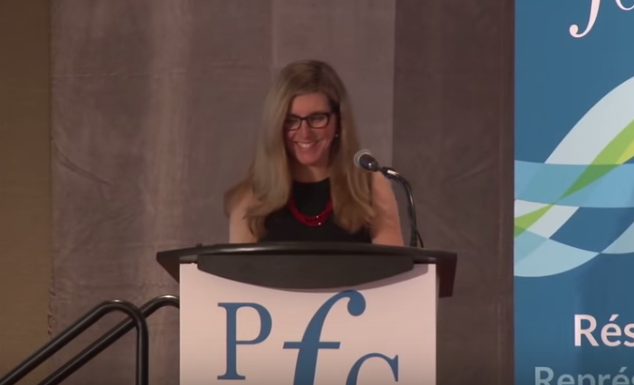
A five-minute “rapid fire” presentation delivered at the Philanthropic Foundations Canada Symposium on Philanthropy, Community and Government in Toronto on October 28, 2015 by Atkinson’s Colette Murphy.
The Atkinson Foundation’s first foray into the public policy development process was to advocate for its own existence. In 1949, the Ontario legislature passed the Charitable Gifts Act to prohibit charities from owning more than 10% of a business – a restriction that did not exist in other provinces or at the federal level. The affect of this legislation was to retroactively prevent the Foundation from owning the Toronto Star after Joseph Atkinson’s death.
Make no mistake: the Charitable Gifts Act was a political move to curb the power of a charity that dared to promote social and economic justice. It aimed to force the sale of a progressive newspaper to competitors who would change its editorial policy and run it strictly for profit.
In the end, the government of the day did not succeed but it took more than a decade of defiant and effective advocacy to overcome this legislative obstacle and to establish the Foundation. It took another 50 years to see the Act repealed and the rights of charities operating in Ontario restored.
Atkinson’s passion for equity and preoccupation with democracy arises from its culture and is revealed through stories like this one. This recent report from Grantmakers for Effective Organizations reminds us that most foundations are rooted in corporate, banking or academic cultures but a few of us inherited something quite different – in our case, the culture of a family who knew poverty intimately before they knew wealth, a firebrand newspaper, and these six principles.
This means that Atkinson is active on several policy files these days. The City of Toronto’s first Poverty Reduction Strategy. Ontario’s Changing Workplaces Review that will modernize employment standards and labour relations. And the Infrastructure for Jobs and Prosperity Act – new legislation that links the province’s multi-billion dollar infrastructure investments with community benefits like jobs, apprenticeships and other economic opportunities for low-income communities.
It’s impossible for me to unbundle these files or to break down our work into discreet philanthropic interventions. Social justice philanthropy is never about one issue, strategy, tactic, or level of government, nor is it ever about a single advocate. We’ve been collaborating with several for close to 20 years and others for just a year or two. This base of workers, employers, community activists, researchers, journalists, philanthropists, public servants and elected officials grows stronger year by year. Our individual voices and efforts are distinctive but its our combined voice and effort that has proved to be most powerful.
For our part, we’ve set up the Atkinson Decent Work Fund to support research and community organizing in places like Weston-Mount Dennis, Scarborough and Peterborough. We’ve waded into the muddy collaborative policy work of building a pathway for job seekers in the construction sector. We’ve partnered with think tanks to uncover and document what’s working in other jurisdictions. And we’ve collaborated with the Toronto Star to inform public discourse on policy issues.
We’ve faced many barriers, challenges and failures in forming relationships with the people whose private troubles are at the core of public issues. Growing their community of allies is painstakingly slow work. We’ve learned to see difficulties as inevitable, not deal-breakers. So before we jump into an issue, we ask ourselves if it’s worth doing despite the obstacles.
That’s what we did before we entered the fight for universal early childhood education eighteen years ago. And that’s what we did when we set our sights on stronger movements for decent work and shared prosperity just two years ago.
Since then, we’ve been rediscovering the complex relationship between projects, policy and power in our particular context with the help of academics like Dr. Manuel Pastor and others. Projects help us see what’s possible, he says. Policy makes what’s possible standard practice. And power – democratic power – ultimately drives policy reform.
When it comes to public policy, we’re learning to play a series of finite games within the infinite game of social and economic justice. It’s not a game like chess in which some pieces are more powerful than others. Pastor says it’s more like a jigsaw puzzle in which pieces fit together so seamlessly you can’t tell where one begins and the other ends. In chess, there are only two colours and the object is to take over your opponent’s territory. The picture emerges from many coloured pieces in a jigsaw puzzle. A single piece can be multi-hued. Each piece is important – something we discover when we’re close to finishing the puzzle and there are a few missing.
It’s like that with philanthropic projects and policy interventions some times. The power generated by many people – working together for the common good – is too often the missing piece. These three questions can help us play a different game:
Who is included or excluded from the policy development process?
When is it OK to speak for someone else?
How does money help or hinder progress on a public policy issue?
I look forward to hearing your answers to these questions and to continuing this conversation.
